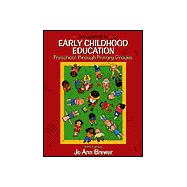
Every chapter concludes with “Celebrating Diversity, ” “Chapter Summary,” “Theory Into Practice,” and “A Teacher Speaks.”
1. Young Children Growing, Thinking and Learning.
Developmentally Appropriate Practice.
Theories of Development.
Children's Development.
2. Designing Schools for Young Children.
Early Schools for Young Children.
Other Influences on Early Childhood Education.
Changes in Early Childhood Education.
Contemporary Models.
Research on Program Models.
3. Creating an Environment for Learning.
Goals and Objectives.
Structuring the Physical Environment.
Instructional Materials.
Children with Special Needs.
Computers in Early Childhood Programs.
Planning the Outdoor Environment.
Planning for Safety-Inside and Out.
4. Planning and Assessing Learning Activities.
Curriculum Planning.
Curriculum Organization.
The Developmentally Appropriate Curriculum.
Learning Plans.
Scheduling.
Program Assessment.
5. Play: Learning at Its Best.
Defining Play.
Describing Play.
Roles in Play.
Development of Play Behaviors.
Purposes of Play.
Play in School Settings.
Play and Academic Learning.
Outdoor Play.
Children with Special Needs.
6. Guiding Behavior Through Encouraging Self-Control.
Guidance, Discipline and Punishment.
Teachers and Discipline.
Guidance and Self-Concept.
Guidance and Curriculum Planning.
Guidance and Beliefs About Learning.
Guidance and Teaching Skills.
Guiding Groups.
Guidance Decisions.
7. Observing and Assessing Young Children.
Definition of Assessment.
Types of Tests.
Testing Young Children.
Strategies for assessment.
Strategies for Organization.
Strategies for Reporting.
Observation, Assessment and Reporting.
Children with Special Needs.
8. Working with Parents and Paraprofessionals.
Need for Parent Involvement.
Realities of Parent-Teacher Relationships.
Encouraging Parent Involvement.
Communication with Parents.
Volunteers in the Classroom.
Working with Paraprofessionals.
9. Celebrating the Magic of Language.
Language Development.
Definition of Language.
Language Systems.
Sequence of Language Development.
Models of Language Learning.
Creating an Environment for Learning Language.
Applying Models of Learning Language.
Observing Language Learners.
Language Development in School Settings.
Children with Special Needs.
10. Developing Literacy.
Popular Debate about the Development of Literacy.
Current Thinking about Literacy Instruction.
Learning to Read.
Learning to Write.
Goals of Literacy Instruction.
Learning How Print is Decoded
A Constructive View of Reading Instruction.
Helping Children Feel Successful as Literacy Learners.
Assessing Literacy.
Children with Special Needs.
11. Manipulation and Discovery Through Mathematics.
Definition of Mathematics.
How Mathematics is Learned.
Teaching Mathematics.
Materials for Instruction.
The Reading-Writing Connection.
Assessment.
Children with Special Needs.
12. Manipulation and Discovery Through Science.
Definition of Science.
Learning Science.
The Scientific Process.
Planning an Early Childhood Science Program.
Suggestions for Experiences in the Classroom.
Using Textbooks.
Integrating Science Through the Day.
The Reading-Writing Connection.
Children with Special Needs.
13. Encouraging the Creative Arts.
Importance of Art Experiences.
Visual Arts.
Music.
Drama.
Roles of the Specialists.
Assessing Experiences in the Arts.
Connecting with Arts and Other Subject-Matter Areas.
Children with Special Needs.
14. Living Together: The Social Studies.
Approaches to Teaching the Social Studies.
A Constructivist View of Social Studies Learning.
Planning Social Studies Education.
Celebrating Holidays.
Social Studies Themes.
Multicultural Education.
Connecting Social Studies with Reading, Writing and Literature.
15. Promoting Wellness: Motor Development, Health and Safety.
Encouraging Motor Development.
Children with Special Needs.
Health, Nutrition and Safety.
Integrating Health and Safety Education.
Celebrating Diversity.
The New copy of this book will include any supplemental materials advertised. Please check the title of the book to determine if it should include any access cards, study guides, lab manuals, CDs, etc.
The Used, Rental and eBook copies of this book are not guaranteed to include any supplemental materials. Typically, only the book itself is included. This is true even if the title states it includes any access cards, study guides, lab manuals, CDs, etc.